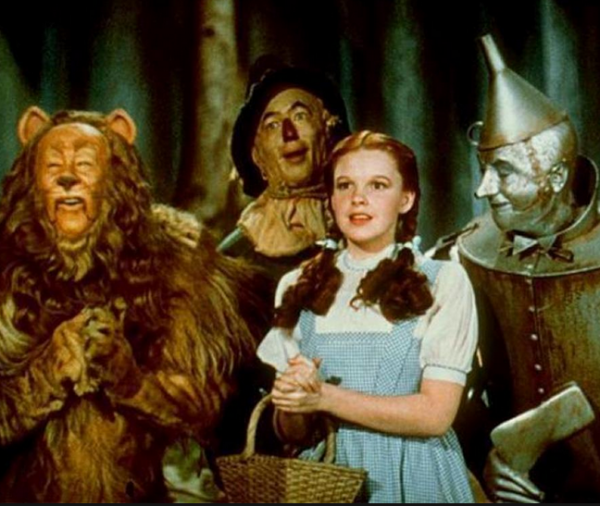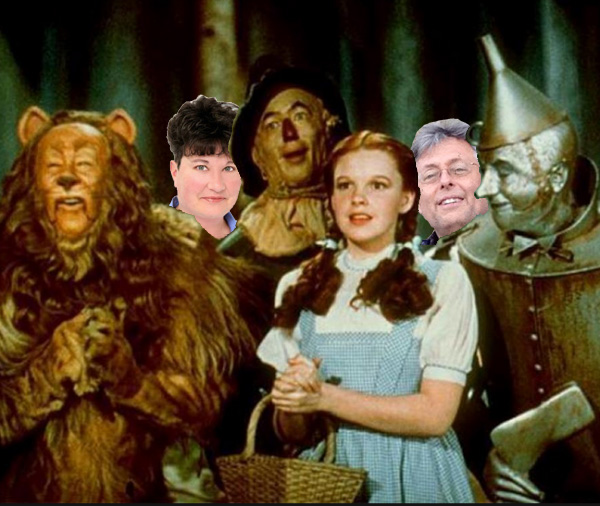
Any movie, just as any life experience from our space-time projected cinema, can be interpreted by our Inner Kindness Teacher in a way that leads us home – to where we’ve never left. Since we all have two mutually exclusive thought systems: ego 100% insane, and Holy Spirit (represented by the Jesus of ACIM) 100% sane, and the decision-making faculty to choose between the two at every juncture, every moment. Since we’re dreaming – and projecting the contents of our mind – 24/7, movies are a great metaphor for what are minds are doing, and a reminder that our lives literally ARE metaphors. We have it all backwards; our material world, bodies and the personas that hide behind them are the metaphors, while our unchanging essential nature (which at times seems metaphoric because we don’t understand pure abstraction) is the underlying reality, in contrast with the dream we call life. What we see on the screen literally and figuratively is metaphor, and it is the mind beyond the projection where our reality can be found.
I think that’s why I’m intuitively drawn to movies, particularly those of the ‘virtual reality’ and allegorical genres; the ones where the inspiration for the film has been influenced by a recognition that there is something more than meets the eye, a better way and a purpose for both recognizing both thought systems and their intended realms.
The Wizard of Oz is rich with metaphysical metaphor. Here are a few examples:
Dorothy’s initial home is in Kansas, in the center or heart of the country; she only dreams of leaving it. The bulk of the movie is in Oz (the dream) where she must overcome her fear by using the classroom of Oz (our forgiveness opportunities) to return home (awaken from the dream) through numerous ‘adventures’ that ego interprets as scary.
The first part of the movie is in black and white; when Dorothy dreams of landing in Oz, she experiences Oz (the dream) as being more ‘real’ (vivid, colorful). By contrast (from within the dream), Kansas seems monotone (gray-scale) and surreal; yet Oz is actually the realm of the surreal, where bizarre characters and events seem to occur.
Dorothy’s arrival in Oz seems to have caused the demise of a wicked witch; which she appears to recoil in (unconscious) guilt upon learning she was responsible for this death. The deceased witch’s ruby slippers magically appear on Dorothy’s feet (the color of blood) becoming both a symbol of her (unconscious) murder and the object of her living sister’s envy and quest for vengeance throughout the film.
At the end of the film, Dorothy discovers that she had the power to go home all along, by clicking the ruby slippers (our under-standing, pun intended) together – bringing what seems apart together. When we bring the symbols of our unconscious guilt (ego’s imagined protection, a.k.a. shields of oblivion) to the light of inclusion, the unfounded darkness disappears and we seem to return home (awaken from the dream) where we never actually left.
The yellow-brick road seems analogous to Ariadne’s golden thread through the labyrinth of the Minotaur in Greek mythology; it could be symbolic of trusting our Inclusive Guide to take us home by forgiving every inch of the way, as we traverse the dark and frightful dream of the unknown with a golden light that remains a path we can trust (the content of kindness) even as the terrain and characters change dramatically (form).
The spirals of the tornado and the yellow-brick road’s origin invoke the geometric symbolism of the duality of any spiral; it can spin outward away from the center where all is calm … or inward (back to the mind) where peace has always been. Ideas only seem to leave their source in dreams.
After leaving the land of the Munchkins, the first character Dorothy meets is the scarecrow who is looking for a brain. If we substitute mind for brain, Dorothy’s question to him becomes “What would you do with a mind if you had one?” This is a terrifying question to pose to ego, equivalent to “What am I?” If we’re mindless, we’ll think that our spiritual instruction is being given to a specific person (I call mine “Bruce: a fiction”) or it’s poster child, the body we see in the bathroom mirror every morning. Ken Wapnick reminds us that our progress in studying ACIM reaches a milestone when we realize that our beloved blue book isn’t addressing us as a person, but rather as the decision-making mind, specifically one that has the capacity to choose against ego, restoring our real Self to our awareness, by default when ego’s identity has been chosen against.
The next character is the tin woodsman, looking for a heart. When we mechanically, dogmatically practice the form, but not the content (our feelings are often a clue when something is ’tilt’) we often feel stuck, usually because we’re not paying attention to when we’re indulging in personal interests at the expense of ‘others’ … we realize that we’re sacrificing kindness to others (being a victimizer) or ourselves (being a martyr or victim); we need the oil of shared interests to loosen up our rigid thinking and find the real heart-felt comfort that transcends ego’s artificial comfort zones.
The third companion Dorothy gathers on her journey is the lion looking for courage. The obvious oxymoron of a lion without courage is a reminder that we’re solidly in the dream world, where everything is upside-down, inside-out and backwards to reality. From within the dream battlefield, everything is fearful and our intrinsic fortitude is reduced to a trembling mass of immobility. It’s only when we bring these aspects together (as protagonist Dorothy does as she gathers her companions with the shared interest of going home together) that we find we can go forward toward Oz, where we can confront bigger fears, having joined forces and practiced on smaller challenges first.
When the four (plus Toto) arrive at the great hall and await audience with the great and mighty Oz, they experience the greatest – and most terrifying – theatrics of all, complete with a huge, monstrous head … but it’s all smoke and mirrors. Our minds are unimaginably powerful, since we made up an entire universe of space-time to hide out in, and it seems so realistic; the best special effects houses in the world with all their computer generated imagery are just tiny reflections of the power of mind … and the lengths we went to (in the tiny mad idea) to escape from an uncommitted crime against perfect Oneness.
They journey further to the wicked witch’s castle where Dorothy finally overcomes her with a bucket of water, which is a metaphor for mind in many symbolic systems. When we just confront – look without judgment, but with a clear, mindful assessment – at the absurdity of ego’s thought system, it just melts away, along with it’s ‘beautiful wickedness’ – our resistance to truth, which often take the form of treasured wounds and savored victimhood ego revels in.
Finally, returning with the witches broom – as requested by the wizard – Dorothy and her team now expect things to change in the land of Oz; they figure they’ve done their appointed task and now it’s time for the wizard to make good on his promises. In other words, we still want to bring our help into the dream and fix the prodigal situation we think (dream) we’re in. Ego never gives up on it’s level confusion tactic, since it doesn’t want to be undone. If we actually address cause (mind) ego knows it’s non-existent (dream) game is over, which is why we keep looking for yet one more dream repair solution to bring us happiness from specifics and circumstances.
Back in Oz’s fearful hall, it’s only when Toto pulls back the curtain revealing the pathetic man posing as a wizard, complete with impressive special effects, that we realize that ego’s highly convincing projections are all just a sham and a diversion to keep us identified with the big screen, instead of what’s going on in the projection booth of the mind. We then realize that our fears of looking at the mind were unfounded; looking at our unconscious guilt by forgiving the dreamer didn’t kill us, but instead gave us even more courage and conviction to return home and awaken from the dream.
The wizard plans to take Dorothy back to Kansas in a hot air balloon – ego’s attempt to use the form of rising above the battlefield of duality, but without the content of changing the cause in the mind that can actually achieve it. It’s then that the good witch reminds Dorothy about the ruby slippers, we bring together (in under-standing) what seems to be apart (seeing the intrinsic equality and sameness of all illusion as being meaningless … which reveals the intrinsic equality and sameness of all that is real and unchanging ) and return from the dream to where Truth – our real, eternally shared Identity has never left, back in the heart of Oneness. The surreal dream (symbolized by Oz) merely ceases to seem to be.
Here’s a related audio interview with CA Brooks on her Sep. 12, 2014 internet show on 12Radio.com and Bruce Rawles on this topic.
